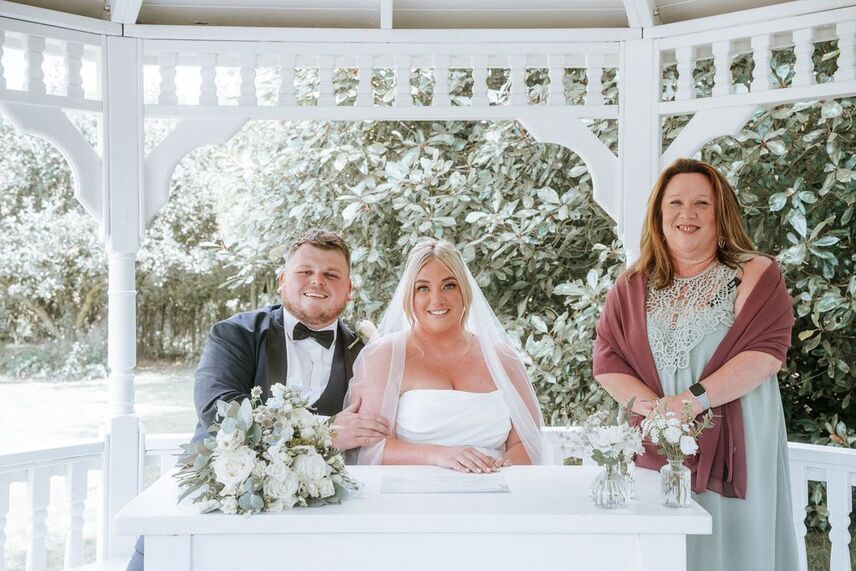Planning a wedding can seem overwhelming if you suffer from anxiety. Thanks to the insights of a bride-to-be and an expert from Anxiety UK, we look at how to deal with the triggers and pressures of the planning period
anxiety (noun) WORRY
‘an uncomfortable feeling of nervousness or worry about something that is happening or might happen in the future’
If the dictionary definition of anxiety strikes a chord, then you’re not alone. Whether you already had an anxiety disorder before you became engaged, or developed one through the pressure imposed during the planning period, then you are amongst an increasing number of people experiencing a bout of pre- (and even post) wedding anxiety.
First off, let’s remember one thing: how you’re feeling is entirely normal. So try not to stigmatise or berate yourself for something so commonplace, and focus on strategies and coping mechanisms that will help you to more successfully manage and mitigate your anxiety.
We talk to one bride about her personal journey and glean some expert advice on how to help ease your anxiety as you approach the aisle...
Too many questions
“It started in my teenage years, with it rearing its ugly head several times in my 20s before I finally found the right therapy when I was 30,” reveals bride-to-be Laura of her long-held anxiety disorder. “It was hard work, but it got my head to a place where I was ready to meet someone. My self-confidence had increased, I was able to relax for the first time in years and my personality was able to shine through.”
“When I met my fiancé Tristan we both knew very quickly that we were perfect for each other. One of the many things that confirmed that for me was one morning I had been overdoing and overthinking, resulting in me crying and shaking. Tristan wrapped me up in a blanket on the sofa and hugged me until I fell asleep. From the way he took care of me when I was struggling I knew he was ‘The One’.”
A romantic proposal during a break in the Cotswolds led to the announcement that they were engaged – and a deluge of questions that spiked Laura’s anxiety levels.
“The more people we told, the more questions were asked: ‘Have you set a date?’, ‘Where are you having it?’, ‘When is the hen do?’... And after all the questions came the well-meaning advice and suggestions,” says Laura. “With so much information and options flying around in my head I quickly became overwhelmed. My anxiety returned with full force; I couldn’t sleep and I had a panic attack for the first time in two years.”
Planning pressures
“It’s likely you will have experienced stress at some point in life already, whether it be from your job, education or other responsibilities,” says Dave Smithson from Anxiety UK (anxietyuk.org.uk). “Some people are more prone to stress and may find seemingly simple tasks a challenging experience. The difference between stress and anxiety is that stress can often be linked to a specific cause and is usually temporary or can be relieved by action. For example, if you are stressed about a deadline, once you have finished the project and the deadline has passed you will no longer feel stressed.”
“Anxiety, on the other hand, is more persistent and can disrupt day-to-day life. With anxiety there may not be one specific cause of worry, you can find yourself worrying about little things all of the time. If the anxiety you experience starts to get out of proportion and you end up feeling more anxious than you would expect someone else to be in your circumstances – this may be a sign of an anxiety condition.”
Dave’s distinction between stress and anxiety is an important one. While one tends to occur in short bursts on a temporary basis, the other can appear as a constant threat: a looming fretfulness that increases in force until, quite often, it can cause total overwhelm and even an inability to think and function properly.
Weddings can heighten anxiety in new and unpredictable ways, as Laura experienced from the outset. “The sheer number of things to be organised and the number of decisions to be made!” she cites as a lead contributor. “Making this more stressful was the time pressure, added to by Covid weddings being pushed back, thus limiting the availability of suppliers. Decision fatigue set in very quickly, I ended up jumping back and forth between what I wanted, even doubting things that I had decided in my head years ago.”
Not only did the internal pressure advance Laura’s anxiety, but her perceived expectations of others became equally as overinflated. “Pressure to ‘keep up with the Jones’ and Instagram really brought out all my perfectionist tendencies,” she admits. “Pressure to keep everyone happy. Differing opinions on the type of ceremony, the guest list, the food...”
“The wedding planning process can be very overwhelming,” Dave confirms. “Sometimes anxiety can affect us so much that we feel genuinely paralysed when it comes to making decisions. Not only are you planning the biggest party of your life, but you may also have external pressures on top of that. Financial worry, family pressures, conflict and decision-making are all common concerns.”
“It is a very special day, so understandably you want to ensure it’s perfect,” he continues. “However, it is very easy to get swept up into the whirlwind of expectations. Social media platforms such as Instagram and Pinterest can add to this pressure,” he adds of the multiple stressors involved. An inability to switch off can rapidly ensue, leaving you struck with a negativity that not only affects your ability to act, but can also impair your relationships as a result.
One solution is that rather than persistently second-guessing your decisions, ask yourself some pertinent questions that relate to your values and goals as individuals and a couple. The trick is to avoid becoming swept up by the stress and outward appearances of things by keeping sight of reality, of who you are and what you want.
“Not everything you see online is real,” reminds Dave. “Social media is deceiving. What you don’t see behind the picture is all the editing that has gone into it, or how much that set-up costs to put together.”
“It’s not just about the look, it is such a special day so how it looks on Instagram is just a very small part of it. It’s about the atmosphere on the day, making that commitment to each other, getting together with family and friends, and most of all – having fun!” Prioritisation and perspective are key.
He raises another vital consideration. “Is it worth getting into debt for?” he asks. “A lot of these ‘extras’ cost extra. Check in with your budget. You don’t want to cause stress further down the line with financial problems.”
Try to picture how you’ll feel both during and after the event once the stress has subsided. “When it comes to the day, you won’t be worried about the little things that seemed so important during the planning. You’ll be thinking, ‘Why was I stressed about table signs? It was the best day ever!’”
Talk...and breathe
Your first response to any feelings of anxiety should be to acknowledge them. The next should be to relocate a sense of perspective, and then if and whenever you’re still struggling with your condition, communicate it to the people in your life that should know, and might be able to help.
“Luckily I have a very good support network,” reveals Laura. “Not only Tristan but my sister and parents too. With their help I was able to stop, take a breath, and breakdown the issues that were bothering me,” explains Laura.
“Talk about it,” urges Dave. “If you feel like you’re being buried under the weight of extra tasks or emotions, reach out to those around you. Talk to a friend about it, no matter how small or silly it may seem. They might be able to help you, or at least reassure you.”
Vocalising your feelings is one of the most vital steps, and should be followed by taking action to abate your anxiety. For example, Laura discovered that a pragmatic approach to the planning helped her to exercise a degree of focus and control that she was comfortable with, allowing her to tease out any issues and problems in a more bite-sized way. “I do love a list!” she announces. “Getting everything down on paper really helps me process information and come up with a plan. I got a diary and wrote a ‘to do’ list for each month. I knew time is of the essence with suppliers being booked up so far in advance and I just couldn’t cope with doing everything at once.”
Her next tip is one that many brides fail to see the value of often until it’s too late: delegation. “I asked Tristan to be in charge of the honeymoon. We discussed possible locations but I left it up to him. My sister is maid of honour so I have left hen do decisions in her capable hands, my mum is on the case with flowers and decorations, and my dad is a great help sorting out the marquee arrangements.”
“No day is worth sacrificing my mental health,” affirms Laura. “It’s impossible for everything to go perfectly on the day, but it can still be your perfect day. Whenever I feel myself getting overwhelmed, I remember that Tristan and I will be getting married, and that’s the only thing that matters.”
Dave’s final words of advice echo Laura’s proactive position, highlighting the importance of staying true to your own intentions and priorities. Everything else, as ever, is just noise.
“Ask yourself: What am I achieving by worrying about this? What can I do to change the outcome of the situation?” he proposes. “If the answer to both of these questions is ‘nothing’, then it does not deserve to occupy this much of your time. Focus on the things you can change.”
Self-care is another seminal and often overlooked part of the planning process, but can pay dividends on the day and beyond. “Eat well, drink well: caffeine and alcohol can both exacerbate feelings of stress and worry. Yes, it a time to celebrate and you should be having fun – just be sure you’re also nourishing your body with plenty of fruit and veg,” Dave sensibly suggests. “And give yourself enough time to recharge by getting some early nights and making sure you’re taking a moment to relax before bed.” It seems such obvious advice, yet many brides and grooms fail to meet their basic needs while in the throes of wedding planning, hampering their wellness – and happiness – as a result.
Also try to bolster a sense of synergy and work together as a team with your fiancé, family and friends, which will help you to stay connected with all of the people in your life – including your self, and to harness a state of harmony and reduce anxiety.
“Breathe,” says Dave of one of the most effective tools for eliciting a sense of calm and connection. “This breathing technique works with the parasympathetic nervous system to bring calm to both the mind and body. Breathe in for four, hold for two, breathe out for six. Be sure that the out breath is much longer than the in breath. This cycle should be repeated at least 6 times.”
A mantra put simply by spiritual master Amit Ray and one well worth remembering: “If you want to conquer the anxiety of life, live in the moment, live in the breath."
 iStock/Ponomariova_Maria
iStock/Ponomariova_Maria
YOUR ANXIETY ACTION PLAN
Dave Smithson of Anxiety UK shares his advice on how to quell anxiety during the pre-wedding period
Time management. Write out all the things you need to get done, then prioritise. Be reasonable about what you can achieve.
When you have too much buzzing around in your head. Make a list of everything you need to do no matter how big or small. Seeing it all written down may alarm you at first but taking an inventory will help you to become as prepared as possible to manage your time and reduce your stress levels.
Budget. Assess how much you can afford to spend. Weddings can be expensive so think of ways in which you can save money.
Share the load. Not just with your partner, but also with family and friends. You’ll be surprised at how excited people are to be involved in your day. It’s ok to let go of the reigns a little and allow others to take some of the workload.
Set boundaries. Remember this day is about you and your partner. Other people will likely want to have a say in what’s going on. Most often this can come from parents, especially if they have contributed financially you may feel like you ‘owe’ them. It’s ok to say no. Be clear and honest about your feelings.
Take breaks. Not every waking minute should be filled with wedding planning. Make sure you have some time to relax. Book in a date night with your partner, get out for some exercise, practise some self-care.
Anxiety UK supports individuals living with or affected by anxiety, stress and anxiety-based depression, their caregivers/family and friends through the provision of a wide range of services and information. For more information on Anxiety UK’s services visit anxietyuk.org.uk
words Hannah May
Main image iStock/milos-kreckovic



.jpg)





.jpg)





